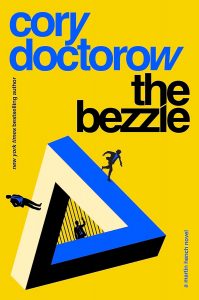Gary K. Wolfe Reviews The Bezzle by Cory Doctorow
 The Bezzle, Cory Doctorow (Tor 9781250865878, $27.99, 240pp, hc) February 2024.
The Bezzle, Cory Doctorow (Tor 9781250865878, $27.99, 240pp, hc) February 2024.
There are a handful of SF writers so sharply attuned to the arcane systems that underlie contemporary culture that it sometimes becomes a challenge to figure out what’s SF and what’s not; William Gibson and Kim Stanley Robinson come to mind, as does Cory Doctorow. The Bezzle, Doctorow’s second novel in a new series featuring forensic accountant Martin Hench (the first was Red Team Blues, reviewed here last July), isn’t nominally SF at all, at least until you start asking yourself where the investigative journalism ends and the speculation begins. That title is a term borrowed from the economist John Kenneth Galbraith, referring to the “‘weeks, months, or years’ that ‘elapse between the commission of a crime and its discovery”’ – or between when the embezzler embezzles and the victims realize they’ve been scammed. There ought to be a similar word for the gap between reading what you approach as a speculative novel and realizing that a good chunk of it has already been happening, in one way or another, for years. At least that’s the sense I get from Doctorow’s detailed descriptions of a whole variety of outrageous financial scams and pyramid schemes ranging from the apparently trivial (like smuggling fast food into the elite communities of Catalina Island) to copyright theft (involving a once-successful soul singer cheated out of decades of royalties and fees) to – most centrally – the startling abuses that a privatized state prison system can lead to.
The Bezzle often reads like SF in another way. Doctorow and his narrator Martin Hench both love to explain complex systems, and they’re good at it. In Red Team Blues, we first met Martin Hench as a brilliant 67-year-old financial detective with a distinct sense of social justice and a penchant for pissing off the wrong people. This time out, he’s reminiscing about how, way back in 2006, his close friend Scott Warms invited him to the wealthy enclave on Catalina Island, where Hench exposes that hamburger-smuggling scheme, which earns him the lifelong enmity of a truly vile financial manipulator named Coleman. When the vengeful Coleman arranges for Scott to be arrested and imprisoned on questionable charges, Hench finds himself facing one of his greatest – and most dangerous – challenges: the massive corruption and extortion resulting from the privatization of state prisons in California and several other states, all sheltered by corporations folded into other financial entities and elaborate accounting tricks, further enabled by catastrophically short-sighted state governments. We’re meant to feel Hench’s own rage at how cruelly inmates become nothing more than pawns to increase shareholder profits, and Doctorow’s explanations (sometimes bordering on lectures, but never boring) are as clear and powerful an account of a very real problem as any investigative reporter could hope for. While for the most part The Bezzle isn’t what you’d call an action novel, it’s plot accelerates notably in its second half, and both Hench and Scott find their lives in imminent danger, and both become victims of the sort of goon violence that are a staple of hard-boiled detective stories. There’s even a glamorous femme fatale who turns out to be a brilliant and useful ally.
Doctorow’s fiction has always been fueled by an acute and righteously angry sense of social injustice, but it’s never been without wit and humor, which comes across here not only in Hench’s world-weary narrative voice and in some of the snappy dialogue, but in casual details that show just how harebrained start-up culture can be – such as a scheme called CabCandi, which “wanted to fill taxi drivers’ trunks with candy and use a web-based dispatch to turn metros’ cabdrivers into a circulating snack-delivery service for hungry stoners.” It raises seven million dollars. It’s not as though we haven’t seen economic and corporate satires in SF before, from Frederik Pohl’s consumerist absurdism to Neal Stephenson’s Hoosegow franchises in Snow Crash, but back then we at least knew it was SF. Now we can’t be so sure (those corporate prisons are already out there). Doctorow wants to make us a bit nervous and more than a bit furious, and The Bezzle does exactly that.
Gary K. Wolfe is Emeritus Professor of Humanities at Roosevelt University and a reviewer for Locus magazine since 1991. His reviews have been collected in Soundings (BSFA Award 2006; Hugo nominee), Bearings (Hugo nominee 2011), and Sightings (2011), and his Evaporating Genres: Essays on Fantastic Literature (Wesleyan) received the Locus Award in 2012. Earlier books include The Known and the Unknown: The Iconography of Science Fiction (Eaton Award, 1981), Harlan Ellison: The Edge of Forever (with Ellen Weil, 2002), and David Lindsay (1982). For the Library of America, he edited American Science Fiction: Nine Classic Novels of the 1950s in 2012, and a similar set for the 1960s. He has received the Pilgrim Award from the Science Fiction Research Association, the Distinguished Scholarship Award from the International Association for the Fantastic in the Arts, and a Special World Fantasy Award for criticism. His 24-lecture series How Great Science Fiction Works appeared from The Great Courses in 2016. He has received six Hugo nominations, two for his reviews collections and four for The Coode Street Podcast, which he has co-hosted with Jonathan Strahan for more than 300 episodes. He lives in Chicago.
This review and more like it in the May 2024 issue of Locus.
 While you are here, please take a moment to support Locus with a one-time or recurring donation. We rely on reader donations to keep the magazine and site going, and would like to keep the site paywall free, but WE NEED YOUR FINANCIAL SUPPORT to continue quality coverage of the science fiction and fantasy field.
While you are here, please take a moment to support Locus with a one-time or recurring donation. We rely on reader donations to keep the magazine and site going, and would like to keep the site paywall free, but WE NEED YOUR FINANCIAL SUPPORT to continue quality coverage of the science fiction and fantasy field.
©Locus Magazine. Copyrighted material may not be republished without permission of LSFF.






